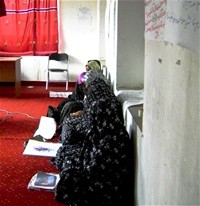
Women receive education on essential health and hygiene topics. They are committed to educate other women in their communities.
USAID/ASGP
Health education empowers 160 women to educate others to protect against diseases and malnutrition.
7 SEPTEMBER 2011 | HIRAT, AFGHANISTAN
A woman in Zinda Jan district of Hirat Province reported that she once accidentally gave veterinary medicine to her child because she did not have basic health information.
Since 2002, the Ansarian Cultural and Literary Association, implemented literacy projects for 25,000 women in remote villages and subsequently provided training in tailoring, embroidery, and carpet weaving for 3,780 women.
Realizing the necessity of educating women in basic health, the association recently launched a health awareness program for 160 women in the Zinda Jan. The program funded by USAID included trainings on maternal health, treatment of diarrhea, and the importance of vaccinations, nutrition, breastfeeding, and hygiene.
The association trains 20 women in each of eight villages and helps them establish a health committee for the village. The women and their local committees are expected to provide health education on a voluntary basis to other residents in the community.
"Before the training, we didn’t pay enough attention to hygiene, like washing our hands when we were breastfeeding our babies and we used to discriminate against our female children by providing them with less healthcare and nutrition," said Azita, a training participant.
Health knowledge is spreading across communities in Hirat Province and knowledge is powerful. When women have more information about health and other essential themes, all of the members of their families have a greater likelihood of being well-nourished, healthy, educated, and prosperous.







Comment
Make a general inquiry or suggest an improvement.